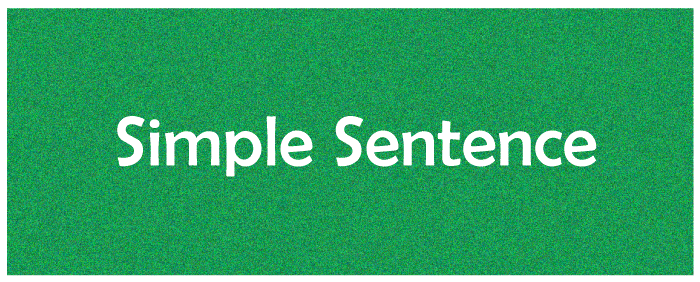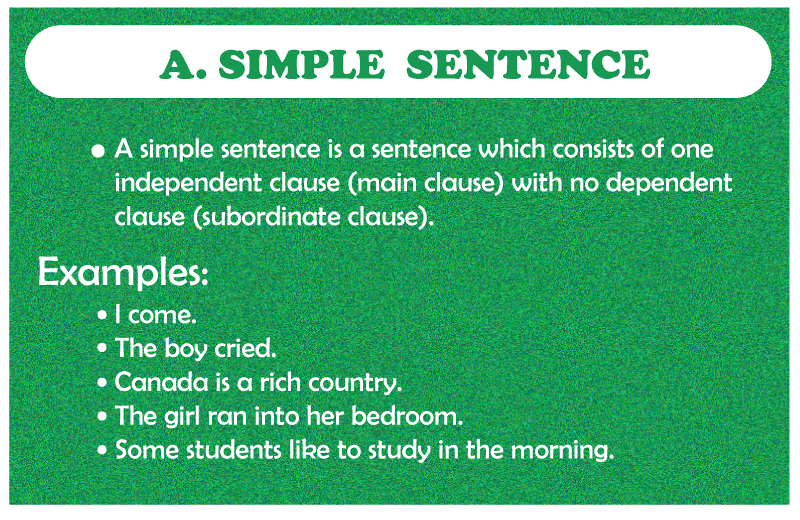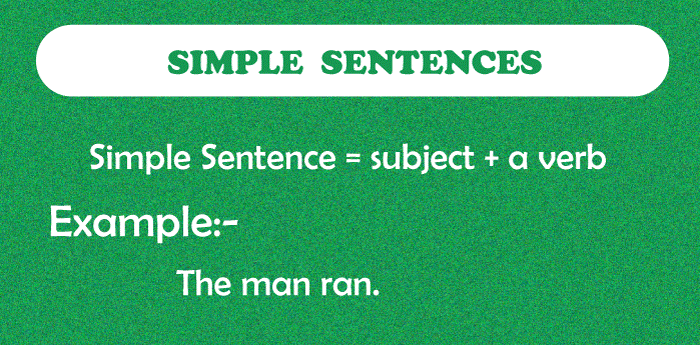Simple SentenceA simple sentence is one that comprises only one independent clause. They have only one subject and, in many cases, only one verb. Simple sentences are the most fundamental of the four sentence forms. Thus a simple sentence, as we may already know, is a grammatical unit composed of one or more words. Each sentence starts with a capital letter and concludes with a full stop or punctuation point. 
What Exactly Is A Simple Sentence?In English, a simple sentence is one that consists of a single independent clause. In a simple sentence, there is usually only one subject and one verb. In other terms, a simple sentence is the most fundamental sentence we can think of! A clause is a collection of words in grammar that includes a subject and a predicate. The subject is the term that specifies the topic of a phrase or who or what is doing an activity. A subject can be a noun (vehicle, John), a noun phrase (short novel, fruit), or a noun substitution (short novel, fruit) (you, they). The subject's action is indicated by the predicate, which is a word. A predicate is a verb and the terms that regulate or alter it (goes, is) (quick, starve). A simple sentence is made up of a single clause that exists on its own and makes complete grammatical sense. As in Tommy is thirsty, a simple phrase has only one subject and one predicate. 
A simple sentence may also contain a compound subject (2 or even more subjects performing the same act), a compound predicate (2 or more acts being executed), and modifiers that define the subject or predicate (like the adjective, adverb, and direct object). Despite having only one clause, it is nevertheless a basic statement. Now that we have a foundational understanding let's look at a few simple sentence examples. We'll discover what they look like and how to recognize them by looking at a few easy lines in English:
What Is the Significance Of Simple Sentences?The word "simple sentence" first appeared in print in 1669. It is derived from the words simple, which means "uncomplicated," and sentence, which means "a grammatical unit of words that represents an independent notion." Simple sentences are the most fundamental statements in English. Simple sentences are widely used in English, particularly to make an idea more understandable. Learning simple sentences will help you understand more sophisticated sentence forms, like compound sentences and complex sentences. How Do You Construct a Simple Sentence?We've learned a little bit about simple sentences and seen several simple sentence examples by now. But how do we write our own simple English sentences? When constructing a simple sentence, keep in mind that it must be an independent clause that can exist on its own without the help of additional clauses to provide meaning. However, the length of them can vary greatly. As an example:
Even though these examples of simple phrases are only two words long, they are still considered simple sentences. This is due to the fact that they comprise both a subject and a predicate (or verb). We can, however, compose longer, simple statements like this one: Lucy mastered playing the guitar by herself. 
When we think of simple statements in English, we may consider them to be quite simple. Longer sentences, on the other hand, can still be simple sentences. The verbs 'master' and 'play' are used in this sample phrase. It does, however, have a single topic and only one independent clause. This sentence might look like this if it were composed of more than one clause: Lucy desired to play the guitar, so she mastered it herself. As can be seen, this sentence is not a straightforward sentence in English. This is due to the fact that it consists of an independent clause, 'Lucy desired to play the guitar,' accompanied by a subordinate clause that relies on the main clause for context. Moreover, the two clauses are separated by a comma. Important Points to Remember About Simple SentencesA simple sentence is not often a short, basic sentence. For instance;
A compound subject could be used in a simple statement (i.e., a subject with two or more simple subjects ). For instance, John enjoys jogging. (This is a straightforward statement with a single subject ("John"). ) Harry and Jessica enjoy going for walks. (This is a basic sentence with two simple subjects ("Harry" and "Jessica"). A compound predicate can be used in a simple phrase (when two or more verbs in a sentence have the same subject). As an example: Peter enjoys swimming. (This is a simple phrase with a standard predicate, with only one major verb ("enjoys").) Why Are Simple Sentences Important?Here's why you should care about simple sentences: Understand when to use a comma preceding "and." Being able to recognize a basic sentence assists with comma placement. Writers are frequently confused about when to put a comma before phrases like "and," "or," and "but" (known as conjunctions). Consider the following examples : Johnny prefers chicken and loves Mutton. Johnny enjoys chicken but despises pork. (Both of these are simple phrases with complex predicates.) In each example, one subject governs two verbs. There is no comma before the words "and" or "but." Compare the two instances above to the following sentences : Johnny enjoys chicken, and he loves Noodles. Johnny enjoys chicken but despises pork. John enjoys swimming but hates shooting. (This is a straightforward statement with a compound predicate.)Two verbs ("enjoys" and "hates") are directed at the subject "John. " John enjoys hiking and swimming, but he despises jumping and shooting. (This is still a straightforward phrase with a compound predicate.) The subject "John" continues to be the subject of two verbs ("enjoys" and "hates"), but we can see how a simple statement can quickly become too complicated. ) Here's an example of a simple sentence having a compound subject, a compound predicate, and multiple direct objects. John and Jessica enjoy hiking and swimming, but they despise jumping and shooting. (This remains a basic sentence.) There are no subordinate or dependent clauses.) Here's an example of a complex simple sentence: Wolf and European bears learned a dread of living beings too late and then became rare in the British wilds, as well as Europe's woods and mountains, during the Middle Ages. (These sentences appear to be identical, but they are not simple sentences with compound predicates. There seem to be two subjects ("Johnny" and "he"), each with its own verb to govern. These are compound sentences rather than simple sentences with compound predicates. Each sentence contains two independent clauses rather than one. There is now a comma between the words "and" and "but." The RuleBefore a "and" (or "but," "or," etc.) that connects two independent clauses, include a comma (i.e., clauses which can exist independently as sentences) Note that the second half of a compound predicate can never exist by itself as a sentence since it lacks its own subject. Johnny enjoys chicken and loves noodles. (In this basic sentence example, "loves Noodles" is not an independent clause.) That is why there is no comma after "and." Johnny enjoys chicken and loves Noodles. (In this compound sentence instance, "he loves Noodles" is an independent phrase. That's why a comma comes before "and." ConclusionWe all converse using language, and most of the time, we use simple sentences. Simple sentences are easier to form than you believe. Keep the following points in mind to easily compose and employ basic sentences.
Next TopicSimple Sentence Examples
|
 For Videos Join Our Youtube Channel: Join Now
For Videos Join Our Youtube Channel: Join Now
Feedback
- Send your Feedback to [email protected]
Help Others, Please Share









